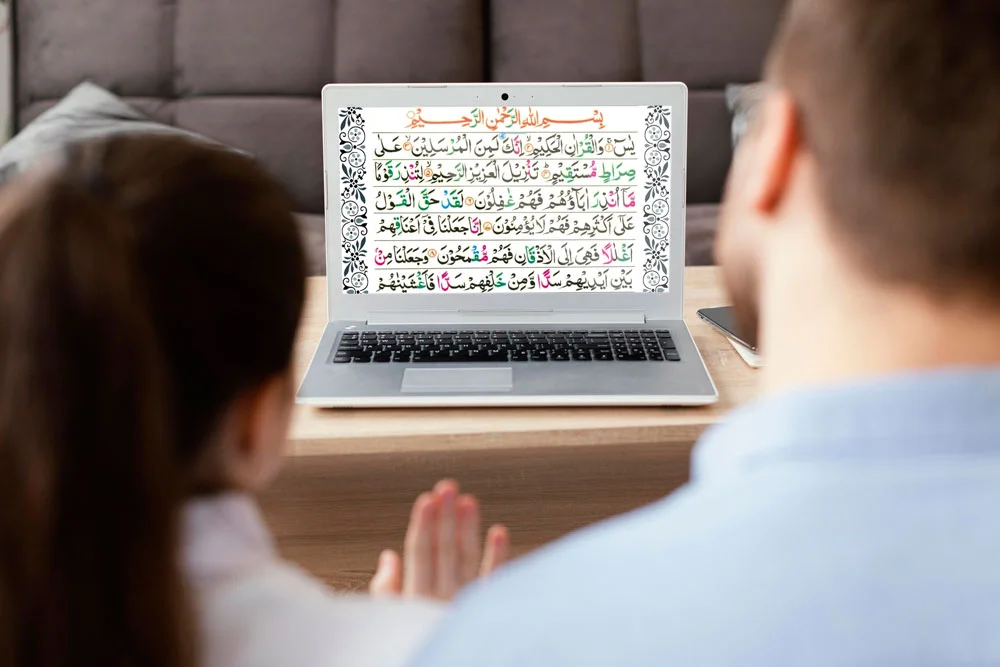For Muslims in the UK, education has always been important when it comes to learning the Quran. Historically, parents have taken their children to local mosques or neighbouring madrasas for instruction. These traditional arrangements, reliant upon parents’ availability and the location of quality Islamic institutions, are not as practical today with busy schedules, long commutes, and a greater emphasis on learning to accommodate different challenges that families face today.
There are, of course, amazing opportunities, but there are also challenges to consider as most families now turn towards a form of “remote” Quran education. Today, the challenge is not in locating a teacher or institution to study with, but with numerous platforms, tutors, and academies claiming to be “the best” for online learning. How do you choose a suitable educator or the best learning option?
Why is Online Quran Learning Increasing in UK
There is a large and diverse Muslim population living in the UK today, and the need for Quran education doesn’t end with children and spans generations. Parents wish for children to learn recitation and memorisation. There are adults learning tajweed classes, refresher education, or maintaining structured Hifz courses within their daily lives.
The shift to using digital platforms has addressed the majority of previous challenges:
Learning that accommodates user schedules that can work around school, work, or family life.
Access to educators for a global audience, including Arabic-speaking educators.
One-to-one custom sessions.
What Actually Matters When You Are Learning Quran Online
With so many options, what is the difference between a beneficial one and a poor one?
1. Experience and Qualifications of the Teacher
Do not only accept the term “qualified teacher.” Ask, are they ijaza (certified)? How many years have they been teaching? Have they specifically worked with children or adults?
2. Class Format and Size
1:1 classes will provide the quickest level of progress. Small groups can always be effective for building confidence, but try to limit classes to no more than 5-6 students max. Never take larger classes, because they encourage passive learning.
3. Progress Tracking
Good academies will provide lesson recordings, weekly objectives, as well as monthly updates, meaning you will know the reality of whether the child is actually learning, or just “attending.”
4. Safeguarding Policies
For children, safeguarding will always be important. Check if they use DBS-checked teachers or have safeguarding policies in place.
5. Technology and Tools
Reliable video platforms, audio and lesson recordings will enable smooth learning. Without good technology and the right tools, a fantastic teacher will not be able to produce uniform results.
Selecting the Best Online Quran Course
Before registering, ask yourself these questions:
Do you do trial lessons, and are they free?
What exactly will you study in the first three months?
How will your progress be monitored?
Will your child have the same teacher each week?
Will lessons be recorded for later viewing or revision?
What is your refund or cancellation policy?
If they are unable to provide clear answers to these questions, it is a sign to reconsider your course selection.
Final Advice for Parents and Learners
Start with a short-term hundred (4-6 weeks) before committing to long-term.
Advise children to practice for 15-20 minutes on days when there is class.
Space your lessons out by saving recordings of the sessions and revising them instead of practising.
For Hifz, consistency matters more than how long the sessions are.
Confirm and stay in correspondence with regards to who is the main teacher, and if something were to change, what the protocol will be.
FAQ’s about Learning Quran Online UK
1. How long does it take to learn how to recite the Quran with tajweed?
It should take about 3-6 months of consistent effort for a dedicated student to be able to recite while applying basic rules correctly. It can take anywhere from 1 to 2 years, depending on the dedication, to begin to recite fluently and apply tajweed rules.
2. Is it better to learn with a teacher in the UK or overseas?
Both have the potential to be wonderful. In the UK, there may be better arrangements around safeguarding, while overseas teachers may have a lot of options at a cheaper price. The idea to scrutinise will be who will be teaching, their experience, and their style.
3. Can children stay focused during online classes?
Yes, they can focus, preferably with interactive lessons, short sessions (e.g., 30 minutes for younger children), structured practice and follow-up time, and with parental supervision, if possible.
4. What equipment do I need to have for online classes at home?
A laptop or tablet with a webcam, stable internet, a headset, and a quiet place to study both during lessons and practice time. Keeping the recording of lessons is beneficial too for revision.
5. How can I tell if my child is progressing?
I recommend looking for regular feedback, recorded readings, and assessments at least every few weeks. A decent academy or tutor will be able to offer regular updates on your child’s pronunciation, fluency, and memorisation.
Conclusion
The option to learn Quran online in UK offers families and adults unparalleled flexibility, a diverse range of qualified teachers, and some form of structured learning opportunities. That said, not all online Quran learning providers are created equal. By focusing on teacher qualification, your child’s progress, Safeguarding, and having a clear curriculum or format, you will be ensuring that your Quran learning experience is meaningful, effective, and sustainable.


